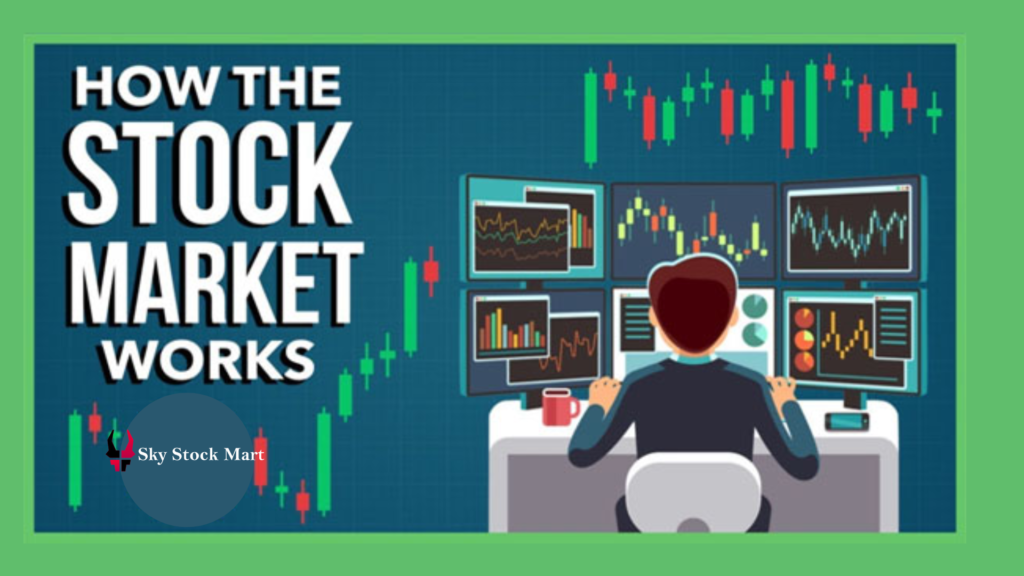How the market Works?
The share market, also known as the stock market, is a dynamic and complex financial system where buying and selling of stocks or shares in publicly listed companies take place. How the market Works? It serves as a crucial platform for companies to raise capital and for investors to buy and sell securities, including stocks, bonds, and other financial instruments. Here’s an overview of key aspects related to the share market: DEMAT ACCOUNT
Basics of the Share Market:
- Stocks and Shares:
- Stocks: Represent ownership in a company and are traded on stock exchanges.
- Shares: Refers to the individual units of ownership in a company. When you own shares, you own a portion of that company.
- Stock Exchanges:
- Major Exchanges: Examples include the New York Stock Exchange (NYSE) and NASDAQ in the United States, London Stock Exchange (LSE) in the UK, and Tokyo Stock Exchange (TSE) in Japan.DEMAT ACCOUNT
- Local Exchanges: Different countries have their own stock exchanges, facilitating the trading of shares in domestic companies.
How the Share Market Works:
- Listed Companies:
- Companies go public by issuing shares through an Initial Public Offering (IPO), making them available for public trading.
- Buyers and Sellers:
- Investors, both institutional and individual,How the market Works? buy and sell shares through intermediaries like stockbrokers.
- Stock Prices:
- Determined by supply and demand dynamics. If more people want to buy a stock than sell it, the price goes up, and vice versa.
Types of Securities:
- Common Stocks:
- Represent ownership and voting rights in a company. How the market Works? Common stockholders may receive dividends and can vote on certain company decisions.
- Preferred Stocks:
- Carry preferential treatment regarding dividends but often do not offer voting rights.
- Bonds:
- Debt securities that represent loans to a company or government.How the market Works? Bondholders receive periodic interest payments and the return of principal at maturity.
Participants in the Share Market:
- Retail Investors:
- Individual investors who trade stocks for personal portfolios.
- Institutional Investors:
- Large entities such as mutual funds, pension funds, and insurance companies that invest on behalf of many individuals.
- Brokers and Market Makers:
- Brokers facilitate trades between buyers and sellers.How the market Works? Market makers provide liquidity by buying and selling shares to maintain a liquid market.
Market Indices:
- Examples:
- Dow Jones Industrial Average (DJIA), S&P 500, FTSE 100, Nikkei 225.
- These indices reflect the performance of a basket of stocks and serve as benchmarks for market performance.
Risks and Rewards:
- Volatility:
- Prices can be highly volatile, influenced by economic conditions, geopolitical events, and company performance.
- Rewards:
- Investors can benefit from capital appreciation, dividends, and the potential for long-term wealth creation.
- Risks:
- Investors face the risk of market downturns, company failures, and economic uncertainties.
Market Analysis:
- Fundamental Analysis:
- Examining a company’s financial health, earnings, and overall performance.
- Technical Analysis:
- Studying price charts, trading volumes, and statistical indicators to predict future price movements.
Regulatory Framework:
- Securities and Exchange Commission (SEC):
- In the U.S., How the market Works? SEC regulates securities markets to protect investors and ensure fair and transparent trading.
- Financial Conduct Authority (FCA), etc.:
- Similar regulatory bodies exist in other countries.
Conclusion:
The share market is a dynamic and vital component of the global financial system. It provides opportunities for companies to raise capital and for investors to participate in the growth and success of businesses. Understanding the basics of the share market is essential for anyone looking to engage in investment activities.How the market Works? However, it’s important to note that investing involves risks, and individuals should conduct thorough research or seek professional advice before making investment decisions.


